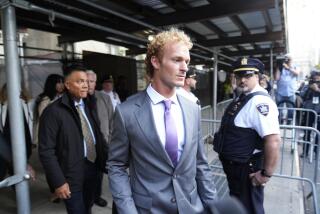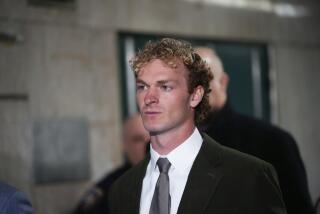Denny Case Defendant Granted Separate Trial
- Share via
One of three defendants accused in the beating of trucker Reginald O. Denny was granted a separate trial Monday, but the judge in the case rejected a defense allegation that the defendants are victims of discriminatory prosecution.
In a surprise development, Superior Court Judge John W. Ouderkirk ruled that Antoine Eugene Miller, 21, should be tried separately from Damian Monroe Williams, 20, and Henry Keith Watson, 28.
All three face multiple felonies, including attempted murder, stemming from assaults on Denny and 12 other people at the intersection of Florence and Normandie avenues in the early hours of civil unrest on April 29, 1992.
In granting Miller’s request to be tried separately, Ouderkirk ruled that evidence against Watson and Williams--who is allegedly shown on videotape striking Denny with a brick--could be prejudicial to Miller’s case.
Ouderkirk denied a defense effort to have cases against the three men dismissed on grounds that they, as African-Americans, had been charged with more serious offenses than white defendants arrested under similar circumstances.
Defense attorneys noted that Miller, for instance, was charged with attempted murder even though videotapes showed him only opening Denny’s truck door and later going through Denny’s pockets as he lay on the ground.
Prosecutors countered that Miller “aided and abetted” those who attacked Denny and others, making him just as culpable “as the person who threw the rock” that struck Denny in the head.
In his ruling Monday, the judge said there is “no evidence whatsoever of discriminatory prosecution against any one of these three defendants.”
But Ouderkirk’s decision to separate the trials “demonstrates to the public that the judge really feels the case against Mr. Miller is a lot weaker than the case against the other two defendants,” J. Patrick Maginnis, one of Miller’s attorneys, said outside court.
The judge’s ruling, he said, “takes a lot of sting out of the prosecution’s case.”
Attorney James C. Gillen, who also represents Miller, said the attempted-murder charges against his client should now be dropped. Asked if he would then consider a plea bargain, Gillen said “we can possibly discuss this case” if the district attorney drops the charge.
Deputy Dist. Atty. Janet Moore, one of two prosecutors on the case, said that there is no plea bargain on the table and that prosecutors are not contemplating “offering Mr. Miller any kind of deal.”
She said Ouderkirk’s decision was a surprise but that prosecutors are prepared to go to trial against all three defendants.
Now that Miller’s case has been separated, Maginnis said, he will seek to have Miller’s $250,000 bail reduced to $25,000.
Legal observers said separating Miller’s trial could be a two-edged sword.
Although Miller’s case might have been hurt by the taped evidence against the other two, they said, he also could have been the beneficiary of the “Briseno Effect”--a reference to Theodore J. Briseno, one of the Los Angeles Police Department officers acquitted on federal charges of violating motorist Rodney G. King’s civil rights. The videotape of the King beating showed other defendants--two of whom were convicted--committing acts much more violent than Briseno’s kick, possibly making him look less culpable to the jury.
Attorney Edi M.O. Faal, who represents Williams, said he is neutral on Ouderkirk’s order separating Miller’s trial. “It’s not positive, it’s not negative,” he said.
But Faal said he would appeal Ouderkirk’s denial of the discriminatory prosecution motion, arguing that the defense was shackled by the judge’s order preventing defense attorneys from comparing this case to others. Ouderkirk said other cases cited by the defense, such as the King beating, were not “legally and factually comparable.”
Because of that ruling, defense attorneys dropped plans to question former state Atty. Gen. John Van de Kamp about how prosecutors decided what charges to file.
“We’re seeking an opportunity to present evidence which we were denied,” Faal said outside court. “The judge simply shackled us and did not allow us to present our case.”
More to Read
Sign up for Essential California
The most important California stories and recommendations in your inbox every morning.
You may occasionally receive promotional content from the Los Angeles Times.













